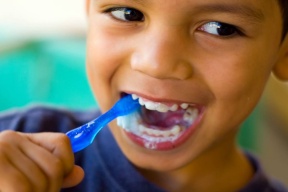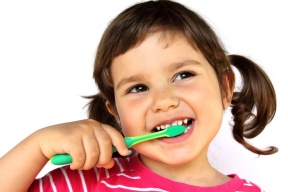By Dr. Kwame Foucher, chief medical officer, UnitedHealthcare of Illinois
Edited by Lawndale Bilingual Newspaper
 Maintaining proper oral health matters more than just keeping a sparkling smile – it’s also important for good overall health. That is especially true for children, as decay in baby teeth can lead to speech problems, oral infections and damaged adult teeth, according to the Centers for Disease Control and Prevention (CDC). Tooth decay is largely preventable, yet it ranks as the most common chronic disease among children. About 33 percent of young kids (ages 2 to 8) have cavities in their baby teeth, and 20 percent of kids in the same age group have cavities in their adult teeth, according to the CDC. In Illinois, the state received a “D” grade for managing children’s oral health based on key measures such as optimally fluoridated water and availability of school-based dental programs, according to The Pew Center on the States. February is National Children’s Dental Health Month, a reminder that proper dental health habits should start early for young people in Illinois and nationwide. To help maintain proper oral health among children, here are tips to consider:
Maintaining proper oral health matters more than just keeping a sparkling smile – it’s also important for good overall health. That is especially true for children, as decay in baby teeth can lead to speech problems, oral infections and damaged adult teeth, according to the Centers for Disease Control and Prevention (CDC). Tooth decay is largely preventable, yet it ranks as the most common chronic disease among children. About 33 percent of young kids (ages 2 to 8) have cavities in their baby teeth, and 20 percent of kids in the same age group have cavities in their adult teeth, according to the CDC. In Illinois, the state received a “D” grade for managing children’s oral health based on key measures such as optimally fluoridated water and availability of school-based dental programs, according to The Pew Center on the States. February is National Children’s Dental Health Month, a reminder that proper dental health habits should start early for young people in Illinois and nationwide. To help maintain proper oral health among children, here are tips to consider:
For baby’s teeth and gums:
Never put a baby to bed with a bottle of milk, formula, fruit juice or sweetened liquid. When these liquids pool in a baby’s mouth, they form a sugary film on the baby’s teeth, leading to decay and infection.
Starting at birth, clean the baby’s gums with water and a soft cloth or child-sized tooth brush. Once a child reaches age 2, parents can start brushing a baby’s teeth with a soft bristled toothbrush and a smear-sized dab of fluoride toothpaste (no larger than a grain of rice), making sure to teach the toddler to spit out the toothpaste.
Schedule the baby’s first dental visit when the first tooth comes in, usually between the child’s first six to 12 months.
For children’s teeth and gums:

Help your child brush twice a day with a small amount of fluoride toothpaste; for children ages 3 to 6, this means a pea-sized dab. Make sure your child does not swallow toothpaste, which may expose them to too much fluoride.
Begin flossing when back teeth begin to come in. Toothbrush bristles cannot reach between teeth, leaving those teeth vulnerable to bacteria and decay.
Limit sugary snacks and drinks between meals. When sugar comes in contact with teeth, decay-causing bacteria can produce acids that damage your child’s teeth. Encourage children to eat healthy snacks, such as fruits and vegetables.
 Maintaining proper oral health matters more than just keeping a sparkling smile – it’s also important for good overall health. That is especially true for children, as decay in baby teeth can lead to speech problems, oral infections and damaged adult teeth, according to the Centers for Disease Control and Prevention (CDC). Tooth decay is largely preventable, yet it ranks as the most common chronic disease among children. About 33 percent of young kids (ages 2 to 8) have cavities in their baby teeth, and 20 percent of kids in the same age group have cavities in their adult teeth, according to the CDC. In Illinois, the state received a “D” grade for managing children’s oral health based on key measures such as optimally fluoridated water and availability of school-based dental programs, according to The Pew Center on the States. February is National Children’s Dental Health Month, a reminder that proper dental health habits should start early for young people in Illinois and nationwide. To help maintain proper oral health among children, here are tips to consider:
Maintaining proper oral health matters more than just keeping a sparkling smile – it’s also important for good overall health. That is especially true for children, as decay in baby teeth can lead to speech problems, oral infections and damaged adult teeth, according to the Centers for Disease Control and Prevention (CDC). Tooth decay is largely preventable, yet it ranks as the most common chronic disease among children. About 33 percent of young kids (ages 2 to 8) have cavities in their baby teeth, and 20 percent of kids in the same age group have cavities in their adult teeth, according to the CDC. In Illinois, the state received a “D” grade for managing children’s oral health based on key measures such as optimally fluoridated water and availability of school-based dental programs, according to The Pew Center on the States. February is National Children’s Dental Health Month, a reminder that proper dental health habits should start early for young people in Illinois and nationwide. To help maintain proper oral health among children, here are tips to consider: 









